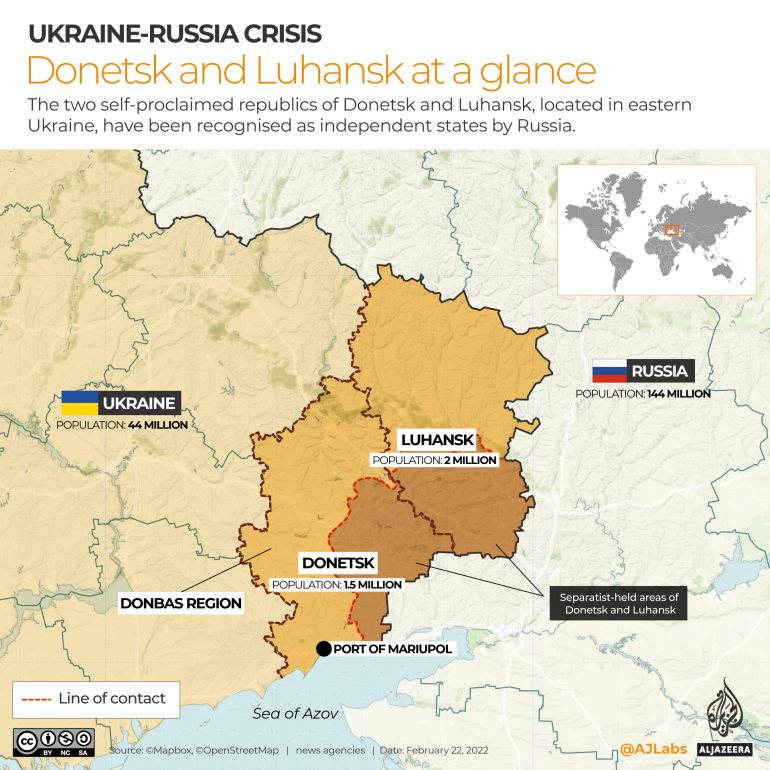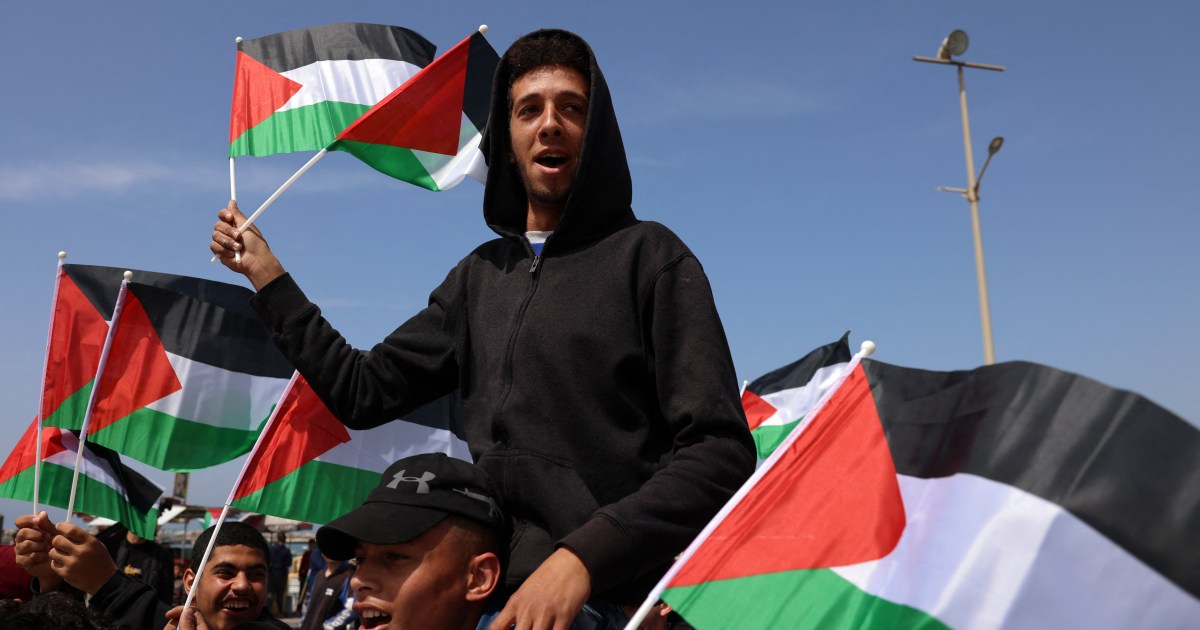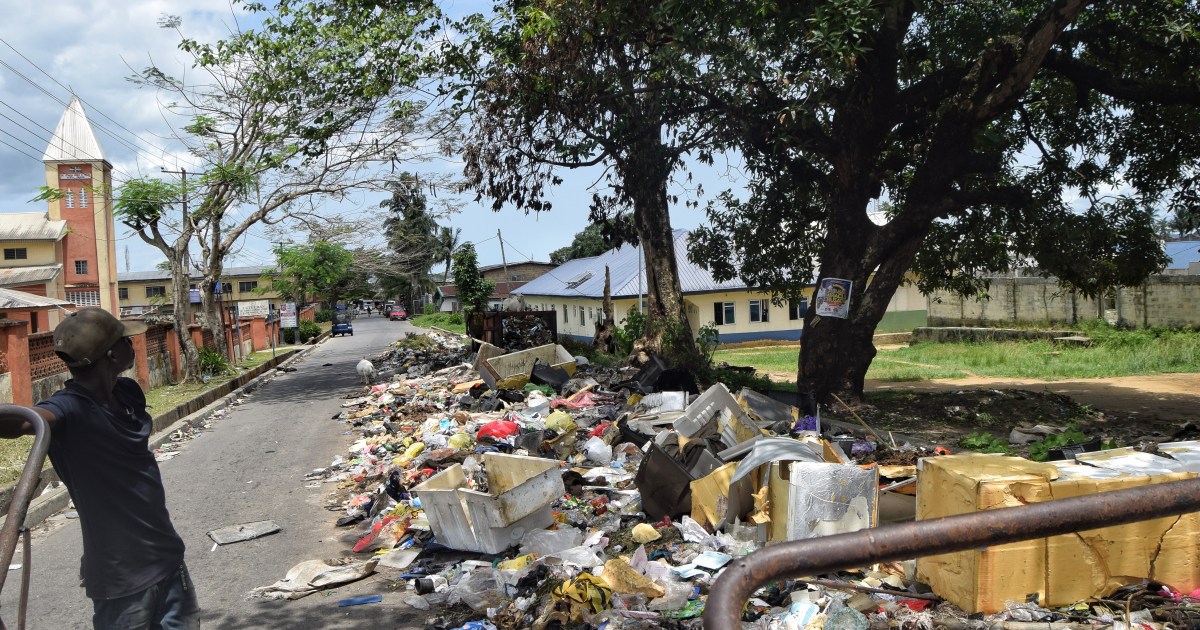Russia declares new phase of war on Ukraine: What to expect? | Russia-Ukraine war News
Kyiv, Ukraine – For Vladimir Putin, Russia’s increasingly spurned president, most of April has looked like a string of disappointments.
Moscow completely withdrew its forces from four Ukrainian regions – Mykolaiv in the south, and Kyiv, Sumy and Chernihiv in the north.
The northern contingent temporarily retreated to neighbouring Belarus.
Hundreds of bodies of civilians, most of them deliberately gunshot, were exhumed in Kyiv suburbs, triggering worldwide condemnation and a new set of sanctions comparable to measures imposed on Iran or North Korea.
And Moscow lost Moskva, its largest warship in the Black Sea, and Ukrainians cheered about how prophetic was its sailor’s phrase: “Russian warship, go f*** yourself!”. Moskva had an advanced S-300 air defence system on board, and its loss complicates Russia’s chances to land paratroopers in Ukraine’s largest seaport of Odesa.
Meanwhile, after weeks of pummelling that has reportedly killed thousands of civilians, the southern port of Mariupol has not fallen because the remaining Ukrainian fighters refused to surrender – even though Russia may have used chemical weapons against them.
Even in the southeastern region of Donbas, whose parts pro-Moscow separatists controlled since 2014, Russia’s advance was glacial and paved with heavy losses.
So, what is next for Putin, who calls the war a “special military operation”, and whose security forces purge anyone who calls it a war?
“The military operation will go on until its full completion and achievement of the goals that have been set in the beginning of this operation,” poker-faced Putin said on April 12.
But his initial goals were to “liberate” Ukraine from its government that Putin dubbed a “gang of drug addicts and neo-Nazis” – and to stop the “genocide” of Russian-speaking Ukrainians – justifications that do not hold water.
Ukrainian President Volodymyr Zelenskyy’s Russian-speaking Jewish grandfather lost his family in the Holocaust, and the majority of Ukrainian civilians killed so far have been from Russian-speaking regions.
Putin’s claims are part of a “campaign of lies” aimed at Russian citizens rather than Western nations, where people have access to “truthful information”, Ivar Dale, a senior policy adviser with the Norwegian Helsinki Committee, a rights monitor, told Al Jazeera.
‘There is very heavy fighting in the east’
Having failed to capture Kyiv and other significant areas, Russia has opened up a second phase of the war – focusing on eastern towns and cities near its border with Ukraine.
On Tuesday, attacks were reported across Ukraine’s eastern front line, as Russian officials spoke about “liberating” the Donbas, an area which is home to two breakaway statelets supported by Russia – the “people’s republics” of Donetsk and Luhansk.
“No matter how un-objectively they accessed the situation before the war began, and built their campaign on this un-objective assessment and conclusions, causing it to fall apart, now there is very heavy fighting in the east,” Lt Gen Ihor Romanenko, former deputy chief of staff of Ukraine’s armed forces, told Al Jazeera.
He said the fighting is fiercest around the eastern towns of Izium, Popasne and Rubizhe, with constant shelling with the potential to kill many civilians.
Moscow is preparing massive forces for part two of its offensive – and they are far from exhausted.
“We ground a third of Russia’s military potential, but two-thirds are left,” Romanenko said.
Earlier this month, Putin appointed Alexander Dvornikov, who cut his teeth as a wartime commander during the second Chechen war and later led Moscow’s offensive in Syria, as Russia’s supreme commander in Ukraine.
Dvornikov is a proponent of Soviet-era tactics of massive, concentrated strikes that did not work in Ukraine’s forested north, but may be successful in the steppes of the east and the south, Romanenko said.
“They are going to use massive assault forces – aviation, multiple-rocket launcher systems, artillery, they are gathering resources for that,” he said.
One of Russia’s steps could be an advance from Izium, its new logistical hub, southward, to Donbas. But the advance will not be easy; Ukrainians have been digging up and fortifying their positions in the Donbas since 2014.
April rains turned most of the terrain into a trap for tanks and heavy artillery, while fresh foliage will within days hide Ukrainian troops armed with anti-tank missiles that have already burned down hundreds of Russian vehicles.

Putin, however, wants to declare a triumph of some sort on May 9, known in Russia as “Victory Day” and celebrated as the USSR’s victory over Nazi Germany.
“So, they have three weeks and about 200 kilometres (124 miles) that they will have to cross in the endless springtime steppe crisscrossed with deep ravines and riverbeds, to encircle the Ukrainian forces,” Nikolay Mitrokhin, a Russia researcher with Germany’s Bremen University, told Al Jazeera.
Instead, Russia’s top brass may decide to leave Donbas alone and concentrate on taking Kharkiv, Ukraine’s second-largest city with a predominantly Russian-speaking population that has been bombarded for weeks.
“It would be ‘comfortable’ to Putin to report the [takeover of] Kharkiv on May 9,” Mitrokhin said.

Meanwhile, Kremlin-friendly media and public figures have adapted their message to the military failures, a Russian critic said.
“They began with announcements about taking Kyiv in three days, and now they are explaining that it is impossible to take Donbas within several months,” activist and historian Sergey Bizyukin, who fled Russia in 2019, told Al Jazeera.
Regardless, the setbacks will likely damage Putin’s image of a ruler who brought stability after the 1990s, when a chaotic and painful transition to a free-market economy left tens of millions destitute and disillusioned.
“Everything he’s been trying to build in more than 20 years is falling apart like a house of cards,” Bizyukin said.
And Russia’s economy is far from booming.
Rounds of Western sanctions will cripple it for years to come, and high oil prices might not be a saviour given that some Western nations want to terminate their purchase of Russian hydrocarbons.
“Russia has enough resources for six months,” Alexey Kushch, a Kyiv-based analyst, told Al Jazeera.
By the year’s end, its gross domestic product (GDP) will shrink by up to 15 percent, and then two to three years of adaptation will follow, he said.
“In the end, they will have an autarky like that in Iran.”




